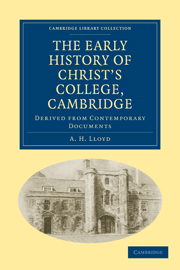Book contents
- Frontmatter
- Preface
- Contents
- LIST OF ILLUSTRATIONS
- List of Abbreviations
- Chronological Summary
- Dedication
- Chapter I William Byngham, the First Founder
- Chapter II The Dispute with John Langton
- Chapter III The First Royal Licence, 1439
- Chapter IV The Expansion of the Milne Street Site
- Chapter V The Royal Licences of 1442
- Chapter VI Marking Time: 1443 to 1446
- Chapter VII The Royal Licence of 1446 and its period
- Chapter VIII The Foundation Charter of the College of Godshouse and its period
- Chapter IX The Relationship of Godshouse and Clare Hall
- Chapter X The Last Days of William Byngham
- Chapter XI The Proctorship of John Hurte, 1451–1458, and of William Fallan, 1458–1464
- Chapter XII The Proctorship of William Basset, 1464–1477
- Chapter XIII The Proctorship of Ralph Barton, 1477–1490
- Chapter XIV The Proctorship of John Syclyng: Early Years, 1490–1496
- Chapter XV The Proctorship of John Syclyng: Later Years, 1496–1506
- Chapter XVI The Negotiations between Godshouse and the Lady Margaret
- Chapter XVII Syclyng's Death and Will
- Chapter XVIII The Buildings and Furniture remaining from the Godshouse period
- Chapter XIX Godshouse and Christ's College
- Appendix
- Index
- Plate section
Chapter XVI - The Negotiations between Godshouse and the Lady Margaret
Published online by Cambridge University Press: 05 October 2010
- Frontmatter
- Preface
- Contents
- LIST OF ILLUSTRATIONS
- List of Abbreviations
- Chronological Summary
- Dedication
- Chapter I William Byngham, the First Founder
- Chapter II The Dispute with John Langton
- Chapter III The First Royal Licence, 1439
- Chapter IV The Expansion of the Milne Street Site
- Chapter V The Royal Licences of 1442
- Chapter VI Marking Time: 1443 to 1446
- Chapter VII The Royal Licence of 1446 and its period
- Chapter VIII The Foundation Charter of the College of Godshouse and its period
- Chapter IX The Relationship of Godshouse and Clare Hall
- Chapter X The Last Days of William Byngham
- Chapter XI The Proctorship of John Hurte, 1451–1458, and of William Fallan, 1458–1464
- Chapter XII The Proctorship of William Basset, 1464–1477
- Chapter XIII The Proctorship of Ralph Barton, 1477–1490
- Chapter XIV The Proctorship of John Syclyng: Early Years, 1490–1496
- Chapter XV The Proctorship of John Syclyng: Later Years, 1496–1506
- Chapter XVI The Negotiations between Godshouse and the Lady Margaret
- Chapter XVII Syclyng's Death and Will
- Chapter XVIII The Buildings and Furniture remaining from the Godshouse period
- Chapter XIX Godshouse and Christ's College
- Appendix
- Index
- Plate section
Summary
It has been shewn in an earlier chapter that the indebtedness of the college to Fisher for guiding the Lady Margaret's bounty towards the advancement of the fortunes of Godshouse was handsomely recognised by the society while he was yet living. His part in the great work done by the foundress for the college has never ceased to hold high honour in the private thoughts of its members, as well as in formal and official celebrations such as annual commemorations and less frequent observances. It was maintained also that Fisher was not at any time a member of the college, and there is need therefore to indicate, if it may be found, the connection with Godshouse which led to his recommendation to his royal mistress that produced so great promotion of its interests.
It must not be overlooked that the foundation of Godshouse by Henry VI, uncle to the Lady Margaret, gave the appeal for its advancement a powerful claim in her eyes, but it is more possible to regard that fact as an argument used by Fisher to enforce his recommendation than to look upon it as constituting his prime motive. There were in all thirteen colleges in Cambridge in 1503, and of every one it might truthfully be said that it could have shewn good cause for the extension to it of any additional bounty that might be available, while several might have proved that their numbers and their revenues fell far short of the pious intentions of their founders, one at least being poorer than Godshouse.
- Type
- Chapter
- Information
- The Early History of Christ’s College, CambridgeDerived from Contemporary Documents, pp. 280 - 304Publisher: Cambridge University PressPrint publication year: 2010First published in: 1934



